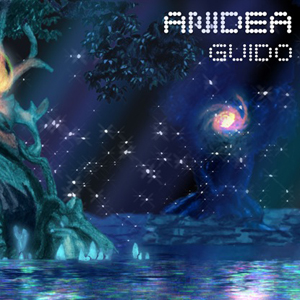Guido Anidea
For all the talk in 2009 about Bristol’s next generation of dubstep producers—largely centered around […]

For all the talk in 2009 about Bristol’s next generation of dubstep producers—largely centered around the hip-hop- and G-funk-influenced “Purple Trinity” of Joker, Gemmy, and Guido—it’s almost shocking how quickly the bass music landscape has changed. While much of the UK scene seems to be gravitating toward house, Joker’s 2010 output includes the “Tron” single and a reportedly scrapped album, and Gemmy seems to have disappeared, all of which leaves Guido and his Anidea album as the de facto torchbearers for Bristol’s youth movement and the “purple” sound. That’s a lot of pressure for a young producer, even one trained in classical and jazz piano like Guido, especially when full-length efforts aren’t exactly dubstep’s strong suit.
Anidea opens with the title track and a restrained tone. Where past Guido singles often relied on thick, layered production and blasts of lazer-like synths, “Anidea” is a pensive effort filled with white space and carefully placed notes. Piano and string sounds populate the song, but Guido’s predilection for budget samples and synthesized instruments makes them sound anything but authentic. That’s not a critique; Anidea is loaded with these kinds of cheap sounds, but Guido uses their inherent lack of musicality to create something special. It’s very much rooted in the kind of composition one finds in videogames—Guido is an admitted gaming junkie—which lends his music an otherworldly, almost alien quality. This is particularly apparent on songs that utilize horn samples, another of his specialties. Album standout and anthem-in-the-making “Mad Sax” rides heavily on an absurd saxophone melody, to glorious effect. (The track’s pitch-shifted vocal snippets and dramatic synths also help.) “Cat in the Window” also contains a ridiculous horn crescendo, not to mention a trance-like chord progression that somehow comes across as fresh rather than cloying.
“Mad Sax”
“Cat in the Window”
Yet for all its weirdness, Anidea remains an inherently listenable album, and one that should appeal to those outside of traditional dubstep circles. Between its half-time percussion, hip-hop feel, and chunky, warbling synths, the music sounds quite smooth, whether Guido is crafting an amped synth workout (“Woke Up Early,” “Do It Right”) or an introspective head-nodder (“Take Me Higher”). The effect is only heightened when Guido employs actual vocalists. “Beautiful Complication” isn’t a new tune, but its lurching R&B remains on point. “Way U Make Me Feel” is another retread, but Guido has updated the former b-side with a vocal from Massive Attack collaborator Yolanda, who puts an impressive ’80s soul stamp on the song’s bubbling synths and string flourishes. That said, the album does drag a bit as it comes to a close. The harder-edged “Tango” and album closer “Tantalized” may throw a bone to dubstep moshers looking to smash up the dancefloor, but their low-slung basslines and the latter’s employment of wobble and heavy-metal guitars ultimately sound dated and out of place.
“Way U Make Me Feel” feat. Yolanda
Still, Anidea remains an impressive debut and should be celebrated as a true coming-out party for Guido. The future of “purple” dubstep may be in question—only time will tell if that Joker album ever comes out and, more importantly, if it’s any good—but Guido’s high-concept use of lo-fi sounds bodes well for his future.

